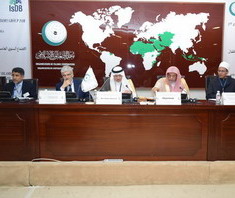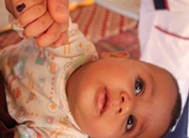 Members of the IAG and Dr Ahmed Al-Mandhari, WHO Regional Director for the Eastern Mediterranean, at the meeting26 November 2018 – The Islamic Advisory Group (IAG) concluded its fifth annual meeting on 14 November 2018, reaffirming its renewed commitment to continue supporting the Global Polio Eradication Initiative, protect children against vaccine-preventable diseases and expand its mandate to support maternal, childhood and other health priorities in line with the Strategic Health Programme of Action of the Organization of Islamic Cooperation (OIC) as endorsed by 57 Member States. IAG also reiterated its trust in the safety, effectiveness and Shari’ah compliance of routine childhood vaccinations. It commended and expressed its appreciation for the efforts made by governments, communities, parents, religious leaders and frontline health workers.
Members of the IAG and Dr Ahmed Al-Mandhari, WHO Regional Director for the Eastern Mediterranean, at the meeting26 November 2018 – The Islamic Advisory Group (IAG) concluded its fifth annual meeting on 14 November 2018, reaffirming its renewed commitment to continue supporting the Global Polio Eradication Initiative, protect children against vaccine-preventable diseases and expand its mandate to support maternal, childhood and other health priorities in line with the Strategic Health Programme of Action of the Organization of Islamic Cooperation (OIC) as endorsed by 57 Member States. IAG also reiterated its trust in the safety, effectiveness and Shari’ah compliance of routine childhood vaccinations. It commended and expressed its appreciation for the efforts made by governments, communities, parents, religious leaders and frontline health workers.
The IAG is an Islamic consortium that comprises experts and scholars representing major religious institutions along with IAG’s partners and supporters. Al Azhar Al Sharif, the International Islamic Fiqh Academy, and the Islamic Development Bank make up the core partner organizations of the group, along with the OIC, which hosted the fifth annual meeting at its General Secretariat in Jeddah, Saudi Arabia. The Secretariat of the IAG is hosted by the WHO Regional Office for the Eastern Mediterranean, which provides technical support to the group along with UNICEF.
Every human being counts
WHO Regional Director for the Eastern Mediterranean, Dr Ahmed Al-Mandhari, attended the meeting and highlighted the important role played by Muslim countries in helping to eradicate polio. “For the second time only in the history of public health has humankind come so close to eradicating a disabling and killer disease, poliomyelitis, from the face of the earth,” he said. “Muslim countries have been part of this global effort from the start because it is an absolute in Islam to preserve the well-being and physical health of all children and to enable them to access immunization services.”
In his opening speech, His Eminence Sheikh Dr Saleh Bin Abdullah Bin Humaid, President of the International Islamic Fiqh Academy and a member of the Council of Senior Scholars in Saudi Arabia, reiterated that “the tasks and activities performed by IAG are based on the principles of Shari’ah and the teachings of Islam, as well as the duties the religion calls for in terms of preserving health and saving lives. Religion calls for prevention, avoiding all harms and seeking treatment.” His Eminence also praised the expansion of the mandate of the IAG to cover different important health priorities. “Such expansion will definitely increase the IAG’s responsibilities and therefore will require more support and more resources.”
In his opening remarks, His Excellency Dr Yousef Al-Othaimeen, Secretary General of the OIC, said: “Four years down the road, it is encouraging to note the improvement in polio status in the three countries where polio is still endemic. Nigeria has no polio cases this year and in the remaining two countries transmission has been significantly restricted to just a few areas in Afghanistan and Pakistan.”
Dr Al-Othaimeen added: “Despite the fact that the polio threat has shrunk to such a small size that we can count and investigate each of the remaining cases, we cannot afford to be complacent for these are not just numbers. These are human beings and every human being counts”.
Representing His Eminence the Grand Imam of Al Azhar Al Sharif, His Eminence Professor Saleh Abbas Goma Saleh, Deputy of Al Azhar Al Sharif reiterated “Al Azhar’s firm stance advocates for polio vaccination, especially versus the aberrant fatwas and perverse opinions that attack vaccination in a way that can only be described as a lie to religion. On the ground, estimates and statistics indicate that the incidence of polio has been reduced by more than 99.9 % from 1988 to 2018, and this decline has been made possible only by the tireless efforts of all partners to eradicate this crippling disease... We thank WHO, UNICEF and all the scientists, experts and partners who have contributed to this progress to protect humanity.”
Six new translations
His Excellency Dr Mohamed Jouini, Vice President of the Islamic Development Bank, noted with admiration the IAG’s steady success into its sixth year despite the tremendous challenges it faces, thanks to the tireless efforts exerted by all IAG members to support its activities. “We appreciate IAG’s role in supporting polio activities in Afghanistan, Pakistan and Somalia that contributed to the reduction of the transmission of polio to the lowest level ever,” he said. “This good sign shows that we are on the verge of declaring the world polio free.” The Islamic Development Bank also commended IAG’s initiative to train and prepare students to become health advocates to increase awareness and reach every child everywhere.
In a speech sent to the meeting, His Eminence Dr Shawky Allam, Grand Mufti of Egypt, emphasized that “vaccinating children against polio and other diseases is a religious duty assigned to parents which they cannot and should not neglect. Only through vaccination can they protect their children’s health and save their lives.” He added: “We strongly denounce all false fatwas which wrongly claim that vaccination is against religious teachings and call on those who promote such false allegations to stop causing harm to their children and communities.”
At the end of the meeting, IAG members issued a statement urging the Governments of Afghanistan, Nigeria and Pakistan to continue to play their leadership roles at all levels to fully implement national emergency action plans, including by securing the engagement of all Islamic scholars, community leaders and mosque imams. It noted that the upcoming low poliovirus transmission season in the three countries, which will run from the last quarter of 2018 through the second quarter of 2019, will provide the best opportunity to stop polio, and hence affirmed the IAG’s willingness to support all religious scholars, health organizations and governments in their efforts to interrupt transmission during this period, with special focus on high risk communities and regions.
Meeting participants also reviewed the progress of the activities implemented in the priority countries over the past year including the implementation of the training programme for students of religious studies from different Islamic universities that was developed by Al Azhar Al Sharif. The programme aims to prepare future religious scholars and mosque imams as advocates for health in their communities and to dispel rumours and misconceptions regarding the safety of vaccines.
During his presentation to participating IAG members, Dr Yagoub Al Mazrou, chairman of the IAG executive committee, announced that IAG’s training manual for religious scholars and students of religious studies on polio eradication and other maternal and child health priorities had been translated by Al Azhar Al Sharif into six languages, namely Dari, English, French, Pashto, Somali and Urdu. This will help to replicate the training programme in further Islamic universities where they are most needed.
The roles of WHO and UNICEF were highlighted, as was the need to better support the National Islamic Advisory Groups in Afghanistan, Pakistan and Somalia in performing their roles at the country level.






